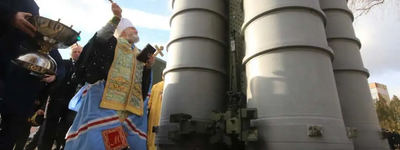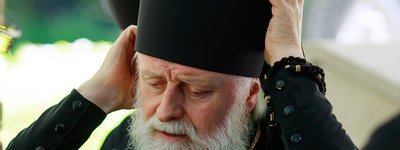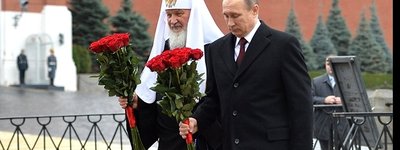August: About Rituals and Draft Laws
In Ukraine, in the early 1990s the search for a universal uniting factor capable of transforming the cultural and social-political unity brought the attention of the national elites to religious institutions. Leonid Kravchuk tried to base himself on one of the churches, but this brought about not only criticism from all others, but also perceptible public tension. His successor, who on the eve of the 1994 election called the Kyivan Patriarchate an “apparatus church” and for some time had ties only with the Ukrainian Orthodox Church-Moscow Patriarchate, relatively soon realized the importance of at least publically demonstrating an equal stance of the state to other churches.
During Leonid Kuchma’s administration joint prayers began in the St. Sophia Cathedral on Independence Day. For all the problems that these prayers could cause in someone from the church folk, they did not have the admiration of the state and its head, they did not have the aftertaste that was caused by some other official celebratory events. These prayers included what Russo called “public religion” – they did not ascend the different religious convictions of the participants, but created an arch that united them all – a citizen of the state at the holiday most important for the realization of this state. This arch was supported by self-understood equally meaningful prayers raised by religious activists that represented every important segment of the society. In all truth, representatives of the Ukrainian Orthodox Church-Moscow Patriarchate, for example, from time to time remembered that they cannot prayer with the excommunicated; opponents were reminded of a dozen other rules of the Holy Fathers that they violate and somehow a little the St. Sophia celebration of August 24 became a part of the national ritual. The ritual, produced by a real religious scene of the society, where none of the churches united a majority of faithful of the population and where each of them even if in some regions it is a minority.
President Viktor Yanukovych discarded this ritual. Thus, as sociologists would say, he violated “the aggregate of conditional traditional acts that serve as a symbol of certain social-political relations and as the form of their visible expression and consolidation.” The new ritual secures the relations of inequality and evidently deepens the public divide. The argumentation that Yanukovych has his own religious conviction, is faithful to his church and prays there, and does not visit other churches like his predecessors, does not hold up criticism. On the day of the national holiday (as well as the inauguration) Viktor Yanukovych acted as the head of the state and, according to Article 102 of the Constitution of Ukraine, stepped away from it, from the state. And, overall, all public speeches, declarations, and actions of the head of state cannot be perceived differently. Viktor Yanukovych has the indisputable right to believe in any faith and express this faith. But for this he does not should not transform the deep intimate act of communicating with God at a protocol event.
Rituals have the tendency to materialize. And the “material” results don’t always comply with the intentions of the creators of the rituals. Their plans could include using money from the state budget to build and decorate churches “of the main church,” the almost obligatory consecration of state cabinets and the expulsion from them the spirits of predecessors, the reorientation of ministers and sponsors from the “wrong” churches to the “right.” It is not understood if the plan to stretch the churches between political powers, which became evident in August in the declarations of politicians and the gestures of hierarchs, and the deepening of the divided in the religious foundation, is also included. And, most likely, the burst of the most genuine anti-clerical dispositions was not planned. I don’t think that in the UOC-MP that all are absolutely delighted with the “brotherly” authoritative embraces.
Irresponsible statements, obscurantist attacks, absurd initiatives create a stuffy atmosphere to which everyone is gradually adapting. At least, the absolutely crazy statement of Metropolitan Ahafanhel regarding the prevention of constructing a church of the Ukrainian Greek Catholic Church in Odesa provoked neither the indignation of the general public nor the interest of the Public Prosecutor’s office, nor a response of the Party of Regions, which the hierarch represents in the Odesa Regional Council. Well, the Party of Regions did actually react: the president awarded the metropolitan with the order of Yaroslav the Wise.
The second one, the draft Declaration of the Supreme Council of Ukraine On Dignity, Freedom, and Human Rights, submitted by a deputy of the Party of Regions, V. Kolesnichenko, provoked a much more lively reaction. According to the explanatory note, the draft declaration is aimed to implement the “Basics of the Teaching of the Russian Orthodox Church on Dignity, Freedom, and Human Rights.” I am not going to talk about the “Basics” now. Their criticism belongs in a philosophic and theological discussion. Like, for instance, attempts to contrast Christian morality with human rights, accusing human rights, which are called to protect the freedom and justice of condoning violence, doubts as to the universality of the human rights, contrasting that universality with the universality of the “national specificity.” It was also about the fact that many ideas of the document have been borrowed from the social teaching of the Catholic Church and that the document produces possible distortions of human rights and at the same time triumphantly struggles with them.
Unlike the “Basics…” the draft “Declaration” is not subject to discussion, and it is not even because it is rather odd to propose to a legislative body to pass a church document or because the text “The Supreme Council of Ukraine hereby resolves: each person is from birth granted dignity and freedom” looks at least infirm.
The “Declaration” is to a great extent abracadabra now glorifying humanism, now rejecting it completely and accusing human rights of being “penetrating corruption, racism, xenophobia, intolerance, social hostility, lack of culture, destruction of family and the spiritual world of a person”! In addition to the actual church document, the text further contains chants that we and the West are going “in different directions,” that some churches should be more equal than others and that some should not be at all, that rights are alright but there should be our special rights, etc. What is “truly Slavic, Ukrainian, ethic foundations of the human rights? If a person is granted rights from God and consequently the rights are not alienated and no one can take it away from that person, what do the hints on exceptions which can follow from “the spiritual and cultural traditions of countries and peoples” mean?
The main thing is that we have here a very serious substitution, a thimblerig if you will. If the deputy Kolesnichenko really shares the church’s teaching on human dignity, why does not he put it into effect? He as a lawmaker has great powers for that. He can reject (even must reject!) the draft labor Code, which is submitted by his fellow party member and which tramples on the right of workers and envisages the rejection of the 8-hour work day. He should indignantly reject this year’s law on the budget which simply mocks human dignity and the right of common people to education, medical help, the possibility to read in one’s native language, etc. Also our deputy would raze to the ground the draft tax law if he treated the Christian understanding on human rights not as a PR action.
But choice of the object of PR is not the best. If the deputy proposed to pass as a law the Rule of the First Ecumenical Council in Nice, there would be no further question.










